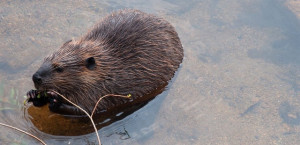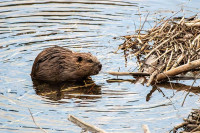

This program originally aired on March 15, 2021
Beavers have been called “Nature’s Engineers.” In fact, the Army of Corps of Engineers could learn a lot from beavers. Instead of re-engineering nature to serve narrow human interests, beavers engineer the natural environment to serve not just their own needs, but the needs of entire ecosystems. Before beavers were nearly extirpated from the Pacific Northwest over a hundred years ago, stream corridors were filled with beavers creating and maintaining complex, water-rich habitats that provided homes and food for a diverse array of fish and mammals, as well as humans.
On this episode of Locus Focus, we talk with Dr. Suzanne Fouty, a retired U.S. Forest Service hydrologist, about the importance of protecting the beaver who are still doing their best to survive in our forests and wetlands, despite harassing, trapping and hunting by people who do not appreciate the vast benefits they provide. Suzanne is a co-author of Oregon House Bill 2843 that would have closed recreational and commercial trapping of beaver on federally-managed public lands in Oregon. Unfortunately the bill never made it out of committee during the 2021 legislative session.
Suzanne Fouty is a retired U.S. Forest Service hydrologist and has spent over 30 years looking at water-related issues in the West. She was a co-author of House Bill 2843 that never made it out of the House Committee on Agriculture and Natural Resources. The bill, had it became law, would have closed federally managed public lands to beaver trapping and hunting which < 170 people participate in. This closure would help Oregon in its climate change preparation, salmon recovery, water quality, stream flow and fish and wildlife habitat improvement efforts at little to no cost and over time bring 100s of millions of dollars of benefits to Oregonians. Suzanne lives in eastern Oregon.
- KBOO

